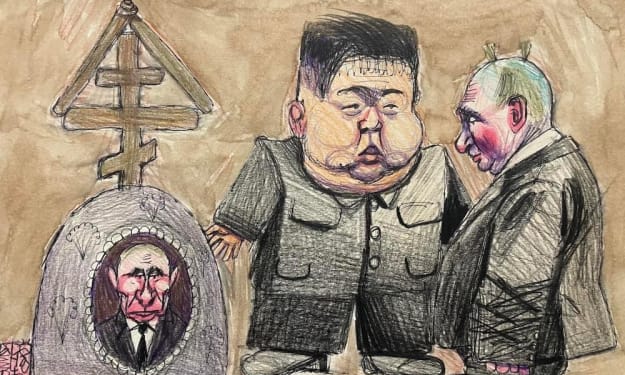The Benjamin in the room
Money is the greatest enigma in the world of economics, warning: mini-tangent incoming

Economics to the layman is often thought of as the study of how people exchange money, taxes, regulation, etc. But the reality is way stranger than that. For one, Economics is more the study of exchange than it is money, in fact, Money as a concept rarely comes up in Economic Formula. I know, Economists rarely talk about Money because money as a concept in Economics isn't included in the formula. For one big reason.
Money as we understand it in the real world, like regardless of where you are in the world. To an economist, it makes no sense to include it in Economic models. Capitalism, is the system most of the world lives under to some extent or another, doesn't definitionally include money either. Funnily enough, Capitalism as a term for the Economic Philosophy of the day wasn't devised by a Capitalist at all. The creator of the word "Capitalism" was Louis Blanc, a French Socialist.
Back to my original point. Money is kind of a Negative value pseudo-commodity. I know, big words. Money, paper money, and coins are a hindrance to any Economic Formula. Because Money is a commodity-of-exchange, it is the thing we use to represent Value in the market. To include the mathematical formula for money, would cause any economic model to completely collapse. Since Physical Money costs "money" to the Government to create.
To be more exact, Money as a tangible thing is a Paradox. To create money, you need money. For example, it costs 5.6 cents to print a single dollar bill. But where do the 5.6 cents come from, the answer? It comes from debt that the Government has. Where does the debt come from? The government printing money. Trust me it is its own thing within Economics, It is called Monetary Economics.
I want to end this on something I said that is kind of interesting, that Money is a Pseudo-commodity. Because it is, kind of. Money as a tangible thing has to be printed or at least has to be authorized by the Central bank of your country. Which costs money, or rather, to be more accurate. It costs debt.
That's another thing, Governments don't use money, they use debt, that's why the National Debt keeps going up, its the debt accumulated by Government spending. But that's not a bad thing, as the debt increases there is more money in the economy, and so long as there aren't any limits to exports or capital exports you will never run into a hyper-inflation situation in the United States.
If the United States did end up with hyperinflation, it would be more to do with the bizarre practice of America's debt ceiling than anything else. Before you say, "Why can't the government not spend money" well then you wouldn't have roads Karen, the economy would crash Karen, your dollars wouldn't be worth anything.
When Economists want to talk about the M-Word, we specifically talk about value. Value is the sum that something is evaluated as being worth either to traders, consumers, the government, etc. When the value of the dollar stagnates and so do wages but prices increase, that is what we know as inflation. Inflation is the term for when more dollars are needed to buy the same number of units one dollar could buy the previous year.
So, why do economists not talk about money, well simply? Money is a social construct, something created in the Sociological sense in a practical sense doesn't carry over logically into economic models. Since you need to spend money to create money. But value can be a stand-alone thing without needing to create it. Although in saying that I can already hear my Marxist comrades screaming, I'll get to you in a second.
If Jim lives in the desert and doesn't have access to fertile dirt, However, James does have access to fertile dirt. The value of fertile dirt to James is low but is high to Jim. That's how relative value is created and that's how Economists typically talk about Value when it comes to raw unprocessed resources.
Then you get to Commodity value, I did say I'll get to you, didn't I? Karl Marx popularized the idea of the Labour Theory of Value. This posits that processed goods aka commodities must have a market value equal to the hours worked by an individual worker otherwise, the surplus is stolen value from the proletariat who made the chair (in this example).
Marxian Economics at its core posits that society is constantly stealing from its workers. Your boss is stealing from you and you do very little to stand up for yourself and your self-worth because you know your boss can just sack you if you "act up". You are a disposable worker, any one of us is disposable to the Capitalist class. Which results in what Marx referred to as Class-Conflict. The Bourgeois need you to be paid less than your actual value at work, to generate profit for them and their shareholders.
But I'm going on a bit of a tangent, Money is Socio-economic as a concept it is the pseudo-commodity we use to represent value in Economics. But in economics, money means very little, value is everything
About the Creator
Quaker-nomics
My name is Abe, I'm a 3rd year Business Economics student mainly specialising in Alternative Business structures like Co-operatives and Accessibility. I mainly write about Business, Politics, Sociology and some personal stuff.
He/him
Enjoyed the story? Support the Creator.
Subscribe for free to receive all their stories in your feed. You could also pledge your support or give them a one-off tip, letting them know you appreciate their work.






Comments
There are no comments for this story
Be the first to respond and start the conversation.